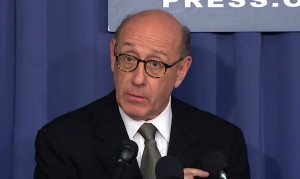
Kenneth Feinberg, administrator fo GM's victims compensation fund, said the team has processed all of the benefit claims.
The team administering the compensation fund for victims of General Motors faulty ignition switches, led by Kenneth Feinberg, has processed the last of the more than 4,000 claims filed seeking monetary damages.
The fund began accepting claims last August and closed the application process at the end of January, handled 4,342 claims, approving 124 death benefits and 266 injury payouts. The minimum payout for death benefits was $1 million.
GM established the fund with $600 million, but through March 31 approximately $200 million has been paid. Ultimately, more than 90% of the claims made were denied by Feinberg and his team were denied. There is no appeal process as claimants gave up the right to any form of appeal.
The automaker was also unable to protest or circumvent the payout determinations made by Feinberg’s team. While there more than 100 death benefit claims approved, 326 were deemed ineligible and another 24 were deficient, meaning the applicant did not provide enough information to make a decision.
Additionally, more than 265 injury claims were approved over two categories, but 3,173 claims were denied and another 429 were deficient. Anyone who accepted a payout from the fund is no longer eligible to file suit against the automaker; however, those who were denied or decided the amount offered wasn’t acceptable can still attempt to sue GM.
There have been several suits filed against the maker related to issue with the faulty ignition switches. The switches led to the recall of nearly 2.6 million small cars produced by the automaker last year.
(Lawyer plans to depose former GM CEO Rick Wagoner and others for lawsuit. For more, Click Here.)
The design of the ignition switch allowed the key to move from the “on” position to the “accessory” position, cutting the power to the vehicle making the vehicle difficult to control and shutting down the airbags in some cases.
The pending lawsuits can be separated into two tracks. The first is for death or injury suits while the other is for owners of the vehicles who have been financially damaged by the loss of value of the vehicles.
(Click Here for details about the new 2016 Chevrolet Silverado.)
Bob Hilliard, the Texas attorney who is leading one of the class-action personal injury and death lawsuits against, plans to depose former CEO Rick Wagoner in September and more than 50 other high-level GM executives. He claims they led an active cover up of the problems with the switches.
But when it comes to suing the automaker, it’s matter of determining what company a litigant can sue. A federal judge has ruled the “new GM” is not liable for death and injury claims for crashes that occurred prior to the automaker’s emergence from bankruptcy in July 2009 – even in the event of misconduct by the “old GM.”
(To see more about the “togetherness” of GM and the UAW heading into talks, Click Here.)
But ruling from the federal bench in New York, Judge Robert Gerber did say owners could seek damages if they prove vehicles equipped with those switches have lost value since GM exited Chapter 11.
